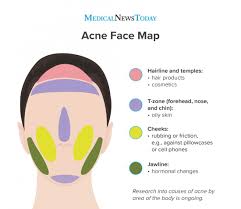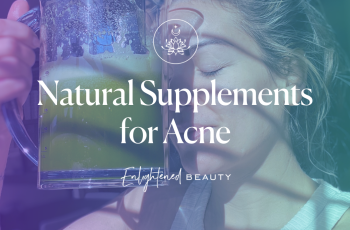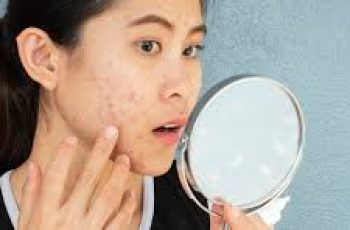
What Causes Acne?
What causes acne for you may be different that what causes acne for your friends. This is because acne comes in many forms and can have a variety of underlying causes. You may suddenly have a breakout, or you may have chronic acne. You may have bad acne or cystic acne, or you might just suffer from skin breakouts with stress or only have clogged pores.
Hormonal changes, skin cell buildup, inflammation, bacterial growth, and diet can all cause or worsen these different types of acne. In this guide, I’ll dive deeper into the main causes of acne and what you can do to treat it. These acne causes and treatment recommendations are based on your skin type, so if you do not yet know your Baumann Skin Type, take a minute to take the quiz before diving into the details!
There are many types and specific cause of acne.
Acne occurs when C. acnes bacteria becomes trapped inside pores, causing inflammation, redness, and sometimes pain.
To treat acne most effectively, use an acne-prone skin care regimen designed for your skin type.
What Is Acne?
Acne is an inflammatory condition of the hair follicle that results in clogged pores, pimples, papules, pustules and acne cysts. Acne can appear on any part of your face or body, but it is most commonly seen on the face, chest, back, and shoulders. While acne is often associated with teenagers going through puberty, it can affect people of all ages.
What Causes Acne?
A number of different factors or combinations of factors can contribute to acne. The main causes of acne include:
Skin cell buildup. Abnormal growth of skin cells leads to comedones (clogged pores), which can become pimples.
Bacterial growth. Cutibacterium acnes (a type of bacteria) colonizes (grows in) the blocked pores, making acne worse.
Inflammation. The hair follicle and surrounding area become inflamed, contributing to acne.
Hormonal influence. When androgens, a type of sex hormone, increase, skin cells grow faster, sebaceous (oil) glands grow, and oil production increases. All of these factors can contribute to acne.
Diet. Certain biochemical markers in the body, which can be influenced by what you eat, directly impact how severe your acne can become.
Skin Cell Buildup
The skin naturally sheds dead cells in a process called desquamation. However, in acne-prone skin, this process is sometimes disrupted due to abnormal growth of skin cells (keratinocytes), causing them to build up. These excess cells can accumulate on the surface of the skin and inside the pores, mixing with oil (sebum) and creating blockages known as comedones, or clogged pores. If the blocked pore becomes inflamed or infected with bacteria, it can develop into a pimple, pustule, or a cyst.
Bacterial Growth
Cutibacterium acnes (C. acnes), formerly known as Propionibacterium acnes (P. acnes), is a bacteria that lives on the skin. In healthy skin, this bacteria is harmless, but when it overpopulates the skin and becomes trapped inside clogged pores, it can multiply and cause acne.
C. acnes bacteria activates Toll-like receptor 2 (TLR-2) and causes inflammation. (Retinoids block activation of the TLR-2.)
undefined
Inflammation
Inflammation happens when your body’s immune system responds to the clogged pores and bacterial growth, leading to the redness, swelling, and sometimes pain that are characteristic of acne breakouts.
Hormonal Influence
Hormones play a significant role in the development of acne, particularly androgens, which are a group of hormones that include testosterone. During puberty, pregnancy, or even due to conditions like polycystic ovary syndrome (PCOS), androgen levels increase, which triggers several changes in the skin that can contribute to acne:
Faster growth of skin cells (keratinocytes). When this growth happens too quickly, dead skin cells don’t shed properly and begin to accumulate on the skin and clog pores, which can lead to breakouts.
Growth of sebaceous (oil) glands. The size and activity of sebaceous glands increase in response to increased androgen. Enlarged sebaceous glands produce even more oil, creating the perfect environment for acne to form.
Increased sebum (oil) production. As noted above, overactive oil glands produce excess oil, which can mix with dead skin cells and get trapped in the pores, contributing to acne.
How Do I Know If Hormones Are Causing My Acne?
Diet
Recent studies show that diet can have a significant affect on acne. In particular, sugary foods, simple carbohydrates, and dairy products (specifically skim milk) have the highest correlation with acne.
For example, increased sugar in the blood triggers IGF-1 (insulin-like growth factor 1), which affect your skin in these ways:
Stimulating oil production.
Increasing the availability of androgens (hormones that can worsen acne).
Promoting the growth of skin cells that can clog pores.
Skin Care Habits That Worsen Acne
Certain skin care habits can also cause acne to worsen or not respond well to treatment. If you are struggling with acne-prone skin, avoid these skin care mistakes to help your skin heal:
Using the wrong moisturizer, leading to dehydration. When your skin becomes dehydrated, it does not dequamate properly, causing a buildup of dead skin cells. Bacteria the moves in and this leads to acne.
Over-exfoliation. When you over exfoliate, it also interferes with desquamation and dead cells build up. (I know you think you are removing them, but over exfoliating actually speeds up desquamation).
Using comedogenic ingredients. Comedogenic ingredients are those that are known to create comodones, or clogged pores. Avoid these ingredients in skin care and personal care products to help reduce clogged pores.
Touching skin with dirty fingernails or using dirty makeup brushes. These habits increase bacteria on the skin, which can lead to acne.
Cosmetic procedures like dermaplaning, laser treatments, or deep peels. These also disrupt the skin’s natural keratinization and desquamation processes.
Facials. If done incorrectly, extractions push debris deeper into the skin, causing the skin to react which can result in an acne breakout, acne cysts, or epidermal inclusion cysts.
Skin purging from retinoids. “Skin purging” refers to an acne flare when you begin using a new ingredient such as retinol. If you do not gradually introduce a new retinoid into your skin care regimen, it can lead to breakouts.
Controversies on Acne Causes
There are some current controversies on the causes of acne:
Increased sebum. increased sebum alone does not cause acne. Studies have shown that it might not be increased sebum production that is the issue as much as it is the lipids in the sebum change (3).
pH changes. There is much misinformation about pH and skin. The skin’s pH level is crucial in maintaining a healthy skin barrier and preventing acne. A lower, more acidic pH (around 4.5 to 5.5) supports the growth of beneficial bacteria and keeps harmful bacteria like C. acnes in check (4). However, factors such as harsh cleansers or certain skincare products can disrupt the skin’s natural pH, making it more alkaline. This disruption can weaken the skin barrier, leading to increased sebum production, clogged pores, and a higher risk of acne.
Oily skin is not necessarily more likely to have acne. People often misjudge how much sebum their skin produces, especially those with acne, who tend to believe their skin is oilier than it actually is. A study measuring sebum levels using a validated tool, the Sebumeter SM 815®, found that individuals with acne significantly overestimated their skin’s oiliness compared to objective measurements. This highlights the importance of using accurate, validated methods to assess sebum production rather than relying on subjective opinions. Interestingly, while there was a difference in sebum levels on the nose, there was no significant difference in overall objective skin types between people with and without acne, even though their perceptions of their skin types differed (4, 5).
How to Treat Acne
Now that you know what causes acne, you are probably wondering how to get rid of it. The first step to managing acne and getting clearer skin is to use an acne skin care routine personalized for your Baumann Skin Type.
Generally speaking, however, to treat acne, you need to:
Hydrate your skin if it is dry.
Soothe inflammation.
Clear pores.
Inhibit toll like receptor 2 (TLR-2) with retinoids.
Turn on retinoic acid receptors with retinoids.
Normalize desquamation.
For personalized advice on getting rid of acne, find out your Baumann Skin Type and choose products that are right for your skin.
Take the Quiz
undefined
How Long Do Acne Treatments Take to Work?
Acne treatments take at least 8 weeks to work, assuming you are on the correct skin care routine for your skin type.
You can read here why you cannot clear acne fast.
Acne Skin Care Products and Treatments
Acne treatment products should be chosen based on which issues are causing your acne.
These are the 4 main issues that cause acne and the skin care products to target these issues.
1. Acne products that decrease oil production
No topical skin care products can decrease oil production. However, oil production can be reduced internally. Read more about that here.
Oily skin types can use a salicylic acid (SA) cleanser in the morning or a SA toner to can penetrate through the oil to clean out pores. Oily types can use a foaming cleanser at night to remove excess oil from the skin. if you have dry skin, salicylic acid may be too drying for your skin.
Choose a cleanser based on your Baumann Skin Type. Without knowing their skin type, most people choose the wrong cleanser which, can make it hard for you to use acne treatment products such as benzoyl peroxide and retinoids without getting side effects. The cleansers and moisturizers in your acne skin care routine will dramatically affect how well you tolerate any acne treatments.
Take the Quiz
2. Acne products that unclog pores
If you have comedones (clogged pores), make sure you avoid skin care products with comedogenic ingredients.
Salicylic acid (SA) cleans out clogged pores by removing the dead skin cells and sebum. Retinoids regulate the process of cells flaking off the skin, helping to prevent clogging of the pores. Benzoyl peroxide kills acne-causing bacteria that cause inflammation and clogged pores.
These skin care products to clear clogged pores can lead to dryness and flaking of the skin, but are an important part of acne treatment. It may be necessary to skip 1 to 3 days of these pore-unclogging skin care products if the skin becomes dry and irritated. These pore-clearing ingredients might not be right for your Baumann Skin Type, especially if you have dry or easily inflamed skin. Make sure you shop for acne products using your Baumann Skin Type.
undefined
3. Acne products to decrease bacteria
These treatments decrease acne bacteria:
Oral antibiotics and topical antibiotics
Benzoyl peroxide (BP)
Topical (not oral!) silver
Blue light
The bacteria that causes acne reproduces every 18 hours, so an antibacterial acne treatment should be used twice a day.
Your skin care routine needs an acne treatment product such as these below in your am and your pm skin care routine.
4. Antioxidants
Antioxidants can neutralize free radicals that are caused by porphyrins made by C. acnes bacteria. Some antioxidants also have anti-inflammatory abilities that can calm inflammation in the hair follicle.
What is the Best Skin Care Routine for Acne?
The best acne skin care routine for you should be customized for your skin type because it depends upon these issues:
Sebum secretion rates
Integrity of the skin barrier
Presence of underlying inflammation
How active the melanocytes are
Bottom Line
There are many factors that can cause acne, including skin cell buildup, bacterial growth, inflammation, hormonal changes, and diet. The best acne treatment regimens will address these specific issues that may be contributing to your acne. However, the best way to effectively treat acne is to use a personalized acne-fighting regimen designed for your skin type.
Don’t know your skin type? No problem! Take the quiz now to find out.


